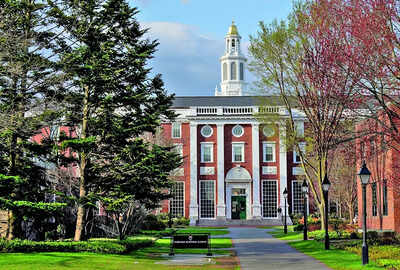Latest Education news – Board Exam Results, Admit Cards, Exam Paper Analysis and Question Papers | Times of India
In an extraordinary show of academic solidarity, 18 leading universities — including five Ivy League schools and Massachusetts Institute of Technology (MIT) — have announced plans to back Harvard University in its legal battle against the Trump administration’s freeze on nearly $3 billion in federal research funding.The coordinated move marks a rare intervention by peer institutions in a politically charged standoff, reflecting deep concerns within the academic community about the future of research funding and institutional autonomy in the United States.
National stakes in a campus fight
The Trump administration’s decision to cut billions in research grants to Harvard has triggered alarm bells across academia. Although the action was initially targeted at a single university, institutions nationwide are warning that the implications stretch far beyond Cambridge.The 18 universities — many of them major recipients of federal research grants themselves — have filed a motion to submit an amicus brief in support of Harvard’s lawsuit. Their aim is to highlight the broader consequences of the funding freeze, including stalled research, damaged careers, and the dismantling of long-term scientific investments.The full list of universities joining the amicus brief includes:Brown University, California Institute of Technology, Carnegie Mellon University, Dartmouth College, Duke University, Johns Hopkins University, MIT, Northwestern University, Princeton University, Stanford University, University of California – Berkeley, University of California – Los Angeles (UCLA), University of Chicago, University of Michigan, University of Pennsylvania, University of Southern California (USC), Yale University, and Washington University in St. Louis.These universities argue that the cuts could destabilize an interconnected research ecosystem, not only harming current projects but also deterring future public-private collaborations. Several of the institutions involved have recently faced scrutiny over their own federal grants, suggesting that Harvard may be just the first in a wider crackdown.
High-profile absences, notable inclusions
While the brief has attracted a diverse coalition of elite institutions, a few major names are conspicuously absent. Columbia University — the first university to face punitive cuts under the Trump administration — has not joined the effort. Columbia previously conceded to several government demands, including stricter campus security measures and protest-related restrictions.Cornell University, which saw $1 billion in research funds frozen in April, also did not sign on. However, Dartmouth College, the only Ivy League school that has not faced direct funding cuts, has joined the amicus effort. This comes despite Dartmouth’s president previously opting out of a collective Ivy League letter condemning the administration’s actions.The amicus brief supports Harvard’s motion for summary judgment, which aims to resolve the case without proceeding to a full trial. Harvard initially sued the government in April after an abrupt $2.2 billion funding cut. The complaint was later expanded to include additional cuts made in May, which totaled another $450 million, as well as a ban on future grants.
Ripple effects already underway
Harvard has already begun notifying research partners across 32 states that it will discontinue over 570 subawards previously backed by federal dollars. The universities supporting the brief argue that these disruptions represent just the tip of the iceberg.They stress that the Trump administration’s funding freeze threatens a decades-old collaboration between academia and the federal government — one that has historically propelled American innovation in science and technology. The broader academic community fears the fallout could erode international competitiveness and compromise the development of future technologies and medical breakthroughs.The brief submitted by the 18 universities is part of a growing chorus of voices seeking to weigh in on the case. Other groups, including civil liberties organizations and alumni coalitions, have filed motions to submit their own amicus briefs. Even Harvard’s Undergraduate Palestine Solidarity Committee has requested to join the case, focusing on claims that political advocacy on campus is being misrepresented as discrimination.
What comes next
The judge has approved the universities’ request to submit the amicus brief, with the Trump administration not opposing the motion and Harvard offering its consent. Oral arguments in the case are scheduled to begin on July 21.For now, the battle over research funding at Harvard has become a flashpoint in a much larger fight — one that could determine the contours of academic freedom, federal oversight, and the future of innovation in the United States.
Source link
Lakshima Sareen
#universities #Harvard #Trumps #funding #freeze #hits #student #research #Times #India
